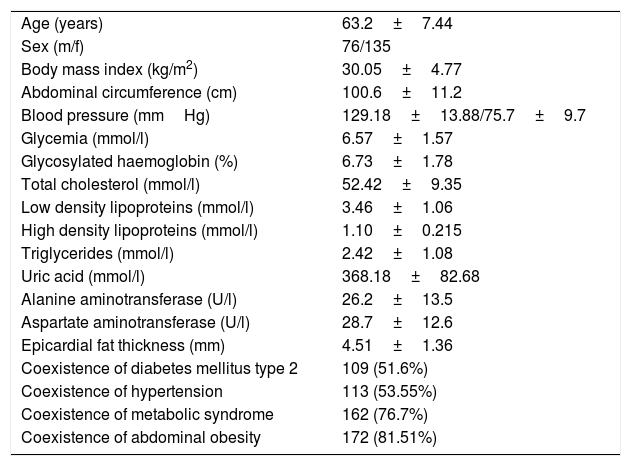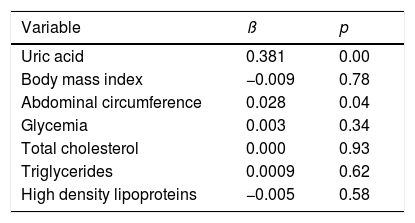Epicardial fat has been associated with increased cardiovascular risk and the development of atherosclerosis. Transthoracic echocardiography provides a reliable measurement of epicardial fat thickness (EFT). The aim of this study is to evaluate the relationship between EFT and biochemical parameters of metabolic risk.
Materials and methodWe assessed 211 patients who underwent echocardiography; EFT was measured by two cardiologists. In addition, patients’ glycaemia, lipid profile and serum uric acid were measured.
Statistical analysis was performed with the Pearson coefficient test and Odds ratio.
ResultsA positive correlation between EFT with glycaemia (r=0.064), total serum cholesterol (r=0.0056), high density lipoproteins (r=–0.038), or with triglycerides (r=0.118) was not observed. However, we did find a significant positive correlation between EFT and serum uric acid (r=0.415, p<0.00001). The odds ratio for EFT>3mm in patients with hyperuricemia was 6.26 (IC 95 2.79–14, P<0.0001).
ConclusionHyperuricemia is strongly associated with EFT in Mexican patients; EFT is a useful tool for global cardiovascular risk calculation.
La grasa epicárdica se asocia a riesgo cardiovascular y aterosclerosis, y puede ser medida en forma fiable por ecocardiografía. Nuestro objetivo es evaluar si existe asociación entre el grosor de la grasa epicárdica (GGE) con marcadores bioquímicos de riesgo metabólico.
Material y métodoEvaluamos 211 pacientes en quienes se realizó la medición del GGE por ecocardiografía. También se les se realizó glucemia, perfil de lípidos y niveles séricos de ácido úrico. Los métodos estadísticos usados fueros odds ratio y coeficiente de correlación y determinación de Pearson.
ResultadosNo encontramos correlación entre GGE con glucemia (r=0,064), colesterol total (r=0,005), colesterol ligado a lipoproteínas de alta densidad (r=–0,038), ni triglicéridos (r=0,118). Sin embargo, encontramos una correlación significativa entre el GGE con la uricemia (r=0,415, p<0,00001). La odds ratio para presentar GGE>3mm en pacientes con hiperuricemia fue de 6,26 (IC 95%: 2,79–14, p<0,0001).
ConclusiónLa hiperuricemia se correlaciona significativamente con el GGE en nuestra población. La medición del GGE por ecocardiografía puede ser un método de utilidad para evaluar el riesgo cardiovascular.









